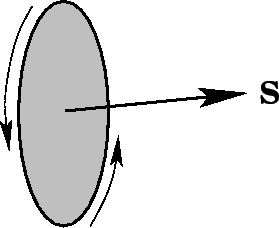


Next: The scalar product
Up: Vectors
Previous: Vector algebra
Vector areas
Figure 4:
 |
Suppose that we have planar surface of scalar area  . We can define a vector
area
. We can define a vector
area  whose magnitude is
whose magnitude is  , and whose direction is perpendicular to
the plane, in the sense determined by the right-hand grip rule on the rim (see Fig. 4).
This quantity clearly possesses both magnitude and direction. But is it a true
vector? We know that if the normal to the surface makes an angle
, and whose direction is perpendicular to
the plane, in the sense determined by the right-hand grip rule on the rim (see Fig. 4).
This quantity clearly possesses both magnitude and direction. But is it a true
vector? We know that if the normal to the surface makes an angle  with
the
with
the  -axis then the area seen looking along the
-axis then the area seen looking along the  -direction is
-direction is
 .
This is the
.
This is the  -component of
-component of  .
Similarly, if the normal makes an angle
.
Similarly, if the normal makes an angle  with the
with the  -axis then the
area seen looking along the
-axis then the
area seen looking along the  -direction is
-direction is
 .
This is the
.
This is the  -component of
-component of  . If we limit ourselves to a surface whose
normal is perpendicular to the
. If we limit ourselves to a surface whose
normal is perpendicular to the  -direction then
-direction then
 .
It follows that
.
It follows that
 . If we rotate the
basis about the
. If we rotate the
basis about the
 -axis by
-axis by  degrees, which is equivalent to rotating the normal to
the surface about the
degrees, which is equivalent to rotating the normal to
the surface about the  -axis by
-axis by  degrees, then
degrees, then
 |
(13) |
which is the correct transformation rule for the  -component of a vector. The
other components transform correctly as well. This proves
that a vector area is a
true vector.
-component of a vector. The
other components transform correctly as well. This proves
that a vector area is a
true vector.
According to the vector addition theorem, the projected area of two plane surfaces,
joined together at a line,
looking along the  -direction (say) is the
-direction (say) is the  -component of the resultant of the vector areas of the two surfaces.
Likewise, for many joined-up plane areas, the projected area in the
-component of the resultant of the vector areas of the two surfaces.
Likewise, for many joined-up plane areas, the projected area in the  -direction,
which is the same as the projected area of the rim in the
-direction,
which is the same as the projected area of the rim in the  -direction, is the
-direction, is the
 -component of the resultant of all the vector areas:
-component of the resultant of all the vector areas:
 |
(14) |
If we approach a limit,
by letting the number of plane facets increase, and their areas reduce, then we
obtain a continuous surface denoted by the resultant vector area:
 |
(15) |
It is
clear that the projected area of the rim in the  -direction is just
-direction is just  .
Note that the rim of the surface determines the vector area rather than the nature of
the surface. So, two different surfaces sharing the same rim both possess the same
vector area.
.
Note that the rim of the surface determines the vector area rather than the nature of
the surface. So, two different surfaces sharing the same rim both possess the same
vector area.
In conclusion, a loop (not all in one plane) has a vector area  which
is the resultant of the vector areas of any surface ending on the loop. The
components of
which
is the resultant of the vector areas of any surface ending on the loop. The
components of  are the projected areas of the loop in the
directions of the basis vectors. As a corollary, a closed surface has
are the projected areas of the loop in the
directions of the basis vectors. As a corollary, a closed surface has
 ,
since it does not possess a rim.
,
since it does not possess a rim.



Next: The scalar product
Up: Vectors
Previous: Vector algebra
Richard Fitzpatrick
2006-02-02

![]() -direction (say) is the
-direction (say) is the ![]() -component of the resultant of the vector areas of the two surfaces.
Likewise, for many joined-up plane areas, the projected area in the
-component of the resultant of the vector areas of the two surfaces.
Likewise, for many joined-up plane areas, the projected area in the ![]() -direction,
which is the same as the projected area of the rim in the
-direction,
which is the same as the projected area of the rim in the ![]() -direction, is the
-direction, is the
![]() -component of the resultant of all the vector areas:
-component of the resultant of all the vector areas:
![]() which
is the resultant of the vector areas of any surface ending on the loop. The
components of
which
is the resultant of the vector areas of any surface ending on the loop. The
components of ![]() are the projected areas of the loop in the
directions of the basis vectors. As a corollary, a closed surface has
are the projected areas of the loop in the
directions of the basis vectors. As a corollary, a closed surface has
![]() ,
since it does not possess a rim.
,
since it does not possess a rim.